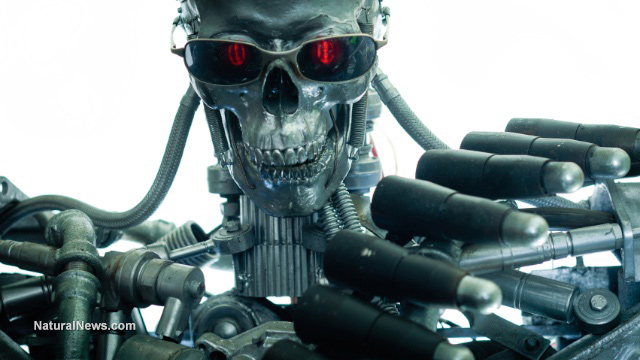Robots could rise up to take over elections from brain-dead
Source: J. D. Heyes
 Robots could rise up to take over elections from brain-dead American voters, legal expert warns
Robots could rise up to take over elections from brain-dead American voters, legal expert warns
A legal expert is warning that laws governing robotics are lagging far behind the technology used to create them. He says they should be updated soon before they start "waking up" and demanding rights �C rights that aggressive, Left-leaning American civil rights lawyers would no doubt secure for them.
In addition, the UK's Daily Mail reports that the expert is arguing that AI �C artificial intelligence �C is coming of age and that it will be necessary to begin addressing problems associated with the rise of AI because robots are blurring the line between human and machine.
"Robotics combines, for the first time, the promiscuity of data with the capacity to do physical harm," Ryan Calo of the University of Washington's School of Law wrote in a paper on the topic, the Daily Mail reported.
"Robotic systems accomplish tasks in ways that cannot be anticipated in advance; and robots increasingly blur the line between person and instrument," he said.
Prominent scholars and experts such as Stephen Hawking and Elon Musk have increasingly expressed concern over the rise of robotics and AI and the dangers posed to humans. In fact, in January, Hawking and Musk penned an open letter to AI researchers warning of the dangers inherent to artificial intelligence.
Some people are already promoting "robot ethics"
The pair warned that without safeguards on the rapidly emerging technology, humans might inadvertently create a dark future for themselves as millions are thrown out of work or the species is eliminated completely.
Calo, meanwhile, has detailed a horrifying thought experiment laying out details in which human laws could need updating to deal with any challenges posed by robots who, for example, might demand the right to vote.
"Imagine that an artificial intelligence announces it has achieved self-awareness, a claim no one seems able to discredit," writes Calo.
"Say the intelligence has also read Skinner v. Oklahoma, a Supreme Court case that characterizes the right to procreate as 'one of the basic civil rights of man,'" he added.
"The machine claims the right to make copies of itself (the only way it knows to replicate). These copies believe they should count for purposes of representation in Congress and, eventually, they demand a pathway to suffrage," he continued.
"Of course, conferring such rights to beings capable of indefinitely self-copying would overwhelm our system of governance. Which right do we take away from this sentient entity, then, the fundamental right to copy, or the deep, democratic right to participate?"
While it would be easy to simply dismiss Calo's suppositions �C as well as those of Musk and Hawking �C as baseless ranting, consider this: The developers of a robotic "dog" have been lambasted by some as being "cruel" to it during testing.
As a sidebar to the Daily Mail story, the web site also published a short report about Google-owned Boston Robotics, which has developed a prototype robotic dog called "Spot" (of course). The sidebar contained looped video showing a researcher "kicking" the robotic dog, which quickly recovers and never falls to the ground. The point of the kick was to demonstrate how stable the machine is on its feet.
Americans already behave like robots
However, as the Daily Mail noted:
[T]he video received an unexpected backlash after people began complaining that the 'dog' in the clip had been mistreated.
During the footage, employees are seen kicking Spot to prove how stable the machine is on its feet, but this has been dubbed "cruel," "wrong" and has even raised concerns about robotic ethics.
Mind you, this "dog" is a machine - a robotic machine �C and yet during the process of legitimately testing its capabilities, it has garnered a sort of empathy and sympathy from humans who want to talk about "ethics" for machines.
Given this lone example, is it such a stretch to imagine humans �C particularly from the United States �C wanting to extend "rights" to cute, cuddly machines which will likely someday physically resemble humans, pets and other "species" as the technology matures?
Perhaps this was inevitable. After all, American voters tend to vote like robots anyway, given that political campaigns are all about cults of personality rather than rule of law, constitutional processes, and policies that are best for the country.
| }
|